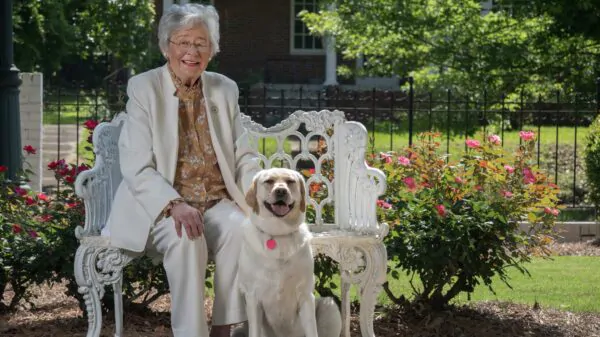By Chip Brownlee
Alabama Political Reporter
An Alabama State Senate committee approved a bill Thursday that would require more Ethics Commission oversight of lawmakers’ consulting contracts if those contracts are outside the normal scope of the member’s profession or business.
The bill as it passed out of committee would require a company or person seeking to hire a member of the Legislature for consulting work to notify the Alabama Ethics Commission before paying the member if the consulting work is outside the member’s “regular profession or line of business.”
The language would give the Ethics Commission more oversight power to keep track of outside consulting contracts once they’re registered with the commission.
“It should have been done back in 2010,” said Rep. Rich Wingo, R-Tuscaloosa, the sponsor of the House version of the bill. “If there are people consulting for companies and they have no expertise or it’s not a part of their expertise, then the Ethics Commission is going to look into that.”
The bill wouldn’t place any requirements on lawmakers to report their contracts before accepting a payment, which would place the burden on companies to report the contracts and absolve lawmakers of any penalty if the contracts aren’t reported.
Since legislators passed the ethics laws in 2010 during a special session, there have been calls to update the ethics laws, particularly since the conviction of then-House Speaker Mike Hubbard on 12 felony ethics violations. Some have called for reforms to strengthen the laws, and others have called for clarifications.
Consulting contracts have long been a concern of both lawmakers and Ethics Commission officials. Several of Hubbard’s guilty counts revolved around consulting contracts he had through his Auburn-based company Auburn Network.
Wingo said his bill would strengthen the ethics laws.
“That’s the whole purpose,” Wingo said.
As part of the 2010 ethics laws, lawmakers often seek advisory opinions from the Ethics Commission before entering into outside contracts. If the Ethics Commission gives a favorable advisory opinion on the contract — essentially interpreting that the ethics laws do not prohibit that contract — lawmakers are given a certain level of protection from prosecution or liability if they attempt in good faith to follow the opinion.
The laws were designed to keep lawmakers from profiting off of their position.
Pittman said there has to be a balance between protecting the public interest and allowing lawmakers — who serve as part-time legislators receiving salaries of about $45,00 a year — to continue working in their private businesses.
“You want real people to run for office, but once you get into office, there are people that come to you,” said Sen. Trip Pittman, R-Montrose, the bill’s Senate sponsor. “You have to discern whether or not you think it’s legitimate business. Based on what your experience is and who you are, is it someone trying to come in and garner favor with you or create an unfair advantage? That’s the balance of power.”
The bill received a favorable report in the Senate Committee on Constitution, Ethics and Elections after Pittman introduced a substitute removing some language in the original draft of the bill that left some members uncomfortable.
The original Senate version contained a provision that would have provided a presumption that certain business arrangements were legally appropriate.
“I think that would be a dramatic shift,” said Sen. Cam Ward, R-Alabaster. “That means anytime anybody in the Legislature wants to take a contract regardless of if it’s grey or not, I could go to the ethics commission and the presumption would be that I’m right. I think that’s dangerous because it would shift the burden of proof.”
That provision was removed from the substitute that passed.
Another provision would have given lawmakers the opportunity to request their ethics filing be made private, shielding them from public disclosure or public records requests.
“That is the challenge, how do you protect doctors and lawyers and accountants that have some of these privacy responsibilities to their clients,” Tripp said. “It’s not an easy thing to do.
That language, too, was stripped as part of the substitute that passed through committee, though the law could still be amended on the floor of the Senate or substituted again.
Some Democrats expressed concern that the language was too strict and could prevent some people of more modest incomes from pursuing a role in the Legislature, echoing long-held beliefs of many lawmakers — both Republicans and Democrats — that the ethics laws place too many restrictions on part-time legislators.
“You must have wealth to be able to serve, in order to be able to be a part of this process,” said Sen. Rodger Smitherman, D-Birmingham, during the committee meeting this morning. “You have got to be able to work more than just what we do here in terms of our jobs, our families and being able to provide.”
Pittman said in a phone interview that the bill wouldn’t prevent lawmakers from being able to continue working. To him, the dividing line is pretty clear.
“Business relationships you had before you ran for office or related to your existing line of business are a lot more cut and dry than if all the sudden you start to branch off into other things, dealing with new people that you met because of your office,” Pittman said.
Smitherman worried the bill would put an additional impediment on lawmakers just trying to do their outside jobs.
“I don’t agree with denying us an opportunity to work, to be able to make a living,” Smitherman said. “If we’re going to go that route, we need to make ourselves full-time legislators.”
Part of that is a given, Pittman said.
“If you’re going to serve in public office, it’s public service, it’s going to affect your career and your ability to make money above whatever you’re getting compensated for by the Legislature,” Pittman said. “There’s no retirement, there’s no health care related to being in the Legislature, so there is legitimate issue there of people needing to be able to earn money and put back some savings.”
Ward voted no on the bill in committee because he said he favors a more comprehensive approach to updating the ethics laws.
“You still have various parts of the ethics law that everybody agrees we should look at and revise, both proponents and opponents of the ethics laws,” Ward said. “I worry that doing a piecemeal approach is going to put us in more of an entanglement, more of a mess than we are in now.”
Ward said he wants to look at the entire act at once.
There have been comprehensive proposals to revise the laws before. The Attorney General’s Office has had a comprehensive reform package since before Attorney General Steve Marshall took office, it’s just never made to State House bill hoppers. Ward said he’d seen the bill when Strange was still in the AG’s seat, but he isn’t sure where it went.
“We don’t need to weaken it but we do need to clarify some of the definitions,” Ward said, pointing to disagreement over the definitions of lobbyist, principal, thing of value and pre-existing relationships — all of which played major roles in Hubbard’s case.
The ethics laws are always a hot-button issue in the State House, but Pittman said this is a good first step to clarifying the law without stripping its teeth.
“Anytime you’re dealing with this issue, you’re trying to make it stronger and you’re trying to clarify, but there’s always perceptions of what’s going on,” Pittman said. “This bill is very straightforward.”
With the committee’s favorable approval, the bill can head to the Senate floor.






















































